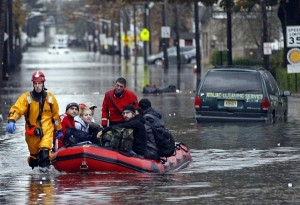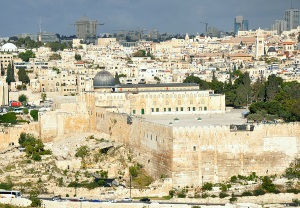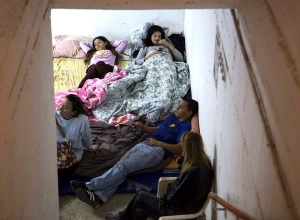 In the terrible wake of Hurricane Sandy which left my family unscathed without even a loss of power in our part of Brooklyn, our friend Dikran was stranded with his two-year-old daughter on the twenty-eighth floor of a high-rise in the blackout across Lower Manhattan.
In the terrible wake of Hurricane Sandy which left my family unscathed without even a loss of power in our part of Brooklyn, our friend Dikran was stranded with his two-year-old daughter on the twenty-eighth floor of a high-rise in the blackout across Lower Manhattan.
His wife Jananne was out of the country and unable to get back for another thirty-six hours. There’s no unhappy ending here, as there was (and still is) for so many in the ongoing aftermath.
I managed to drive into Manhattan in a narrow window of time when one could do so after the storm, and brought Dikran and Nayla back to Brooklyn where they spent the week with us and were later reunited with Jananne.
But how happy can one be, thinking of the mother on Staten Island whose two little boys were swept from her arms in the flood as she tried to break into a stranger’s house for shelter, and now has to live with the fact that she didn’t evacuate in time?
Or thinking about two twenty-something friends in Park Slope crushed under a tree while taking the dog out to pee before the winds got any worse? One had left home when the storm began to check on the other whose father was sick with cancer.
Or any of the 107 (and counting?) other Americans who have died, not to mention scores of Haitians and Cubans before Superstorm Sandy made landfall on our shores?
This sense of collective impact, this awful form of community building that casts any prior notion of it in a lackluster light, was heightened in our household for having two natives of Beirut as refugees and guests.
Jananne and Dikran met here in New York, but grew up in a world where the aftermath of Sandy was par for the course in the fifteen-years from toddlerhood through high school.
These were children who spent up to six months a year in the basement bomb shelters of the buildings where they lived, six months without any amenities whatsoever. The brave or foolish might run upstairs to boil a hot dog or grab a personal item, but other than that it was months on end of Scrabble, blackjack, and chess in a candlelit basement.
Schools would close for extended periods of time, then briefly reopen during a lull in the fighting planning to resume classes, but sometimes only mounting sandbags with the whole student body pitching in.
At age fifteen, Dikran hailed a tank for a ride to the neighborhood grocery store. At age eighteen, when his baccalaureate coincided with the worst period of warfare that felled entire buildings in one strike, he had to travel by plane from one side of the city to the other for the test because it was too dangerous to drive.
(I’ll be reminding my kids of that when it comes time for them to take the SATs.)
But through it all, the sense of community glowed like a candle in those dark basements.
Thomas Friedman, in his magisterial account of the era, From Beirut to Jerusalem, quotes one young resident’s testimony to this phenomenon:
I live in the same building as my parents. Before the war I used to see them for maybe five minutes a day. But during the fighting we would sit together for hours, prepare meals together, play cards, and chat with all the neighbors. If someone found strawberries or bread or cucumbers during the Israeli siege, he would buy enough for all the neighbors and everyone would come together.
In that vein, I’ll never forget the laugh my wife and I had in the kitchen hours before the storm hit, as we sat around with the kids reading, baking, and playing games, with nowhere else to go and nothing much to do.
The forced idleness made a normal day of school, transit, work, and whatnot seem like a far worse hurricane in comparison.
(I say this mindful of those who had their lives upended by the storm and would give anything for a return to such normalcy.)
“I imagine bars and restaurants did pretty well in the face of it,” I said about the civil war while Dikran and I drank Guinness at a pub his first night with us, seeing how business was booming in our neighborhood despite news worsening by the hour with horror stories and body counts.
“Very well, indeed,” he answered. The need to blow off steam and celebrate life was a close second to the need to keep safe and eat.
My memo pad was out, for as happenstance would have it, I’d been developing a TV project about the saga of 1980s Beirut.
“You don’t need to ask any more questions,” Dikran said good-naturedly the next day, when we saw a line of cars for gas over half a mile long. “Because now you’ve seen it all.”
We both knew I had hardly seen it all, but I think he enjoyed having an American friend who got some small glimpse of the kind of world he and so many others grew up in, from Beirut to Jerusalem and Bombay to Johannesburg.
That glimpse broadened yesterday when I went with a friend’s church group to help recovery efforts in Far Rockaway—a waterfront section of Queens where the bay and ocean meet—that was absolutely battered.
This part of the city didn’t bear certain traits of a war zone; it was a war zone: Soldiers in fatigues at distribution sites doling out blankets and water. Shell-shocked residents adrift in the streets. People standing in endless lines for diapers, flashlights, and food. Boarded-up franchises with spray-painted messages to would-be looters letting them know they’d already been looted and there was nothing left. Streets strewn with debris from the tidal surge, dumpsters tossed like candy wrappers and freight trucks like toys.
Was this America? Yes, and as some pundits from climatology to national security would have us believe, it’s only just the beginning of what’s to come.











